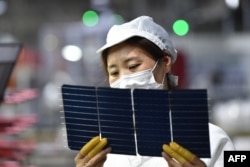U.S. Treasury Secretary Janet Yellen, who is on a five-day visit to China, expressed concerns to Chinese officials on Friday that state subsidies are exacerbating overcapacity in industries including electric vehicles, solar panels and semiconductors.
U.S. officials and economists warn that China’s overcapacity – when its ability to produce significantly exceeds market demand – will further drive down prices and reduce jobs, especially if China seeks to shed excess production through exports rather than domestic consumption. .
U.S. President Joe Biden said in a phone call with Chinese President Xi Jinping on Tuesday that China’s “unfair” trade policies and “non-market” practices harmed the interests of American workers and families.
According to Beijing, Chinese Foreign Ministry spokesman Wang Wenbin briefed reporters on the trade dialogue between the two leaders at a regular briefing on Wednesday. He said, “The United States has taken a series of measures to suppress China’s trade and technological development, and has added more and more Chinese entities to the sanctions list. This is not ‘risk removal’, but creating risks.”
So, when does an industry experience overcapacity?
Gary Clyde Hufbauer, a senior fellow at the Peterson Institute for International Economics, said that for capital-intensive industries such as steel, oil refining, and semiconductors, when capacity utilization is below 75% for a long time, most observers will believe that Overcapacity.
Hufbauer told VOA that China’s massive investment in government stimulus and bank financing has led to overcapacity in nearly all of the country’s capital-intensive manufacturing industries.
“If China does pursue a large-scale export ‘solution’, it will harm manufacturing companies in Japan, the EU, South Korea and other industrial countries. But low prices will be welcomed by many developing countries in Latin America, Africa and Asia,” he said .
A report released last week by New York-based Rhodium Group said Research on the Chinese market shows that China’s silicon wafer capacity utilization rate dropped from 78% in 2019 to 57% in 2022. In 2022, China’s lithium-ion battery production will reach 1.9 times the domestic installed capacity, showing that the problem of overcapacity is emerging in the clean energy field.
China’s exports of electric vehicles, solar cells, and lithium batteries have grown even more significantly. Data show that China’s electric vehicle export volume in 2023 will be seven times that of 2019, while solar cell export volume in 2023 will be five times that of 2018, an increase of 40% from 2022.
The report notes that while temporary overcapacity may be harmless and a normal part of the market cycle, it becomes a problem when government intervention perpetuates it.
The Rhodium Group report said China’s National People’s Congress meeting in March focused on industrial policies that would benefit high-tech industries, while providing little financial support for household consumption.
“This combination of policies will exacerbate the growing imbalance between domestic supply and demand,” the report said. “A systemic bias in favor of producers rather than households or consumers allows Chinese companies to increase production despite lower profit margins,” the report said. There is no need to worry about the bankruptcy restrictions faced by enterprises in a market economy.”
Overcapacity ten years ago
China’s structural overcapacity problem is not a new phenomenon. The Rhodium Group report said the last time China had serious overcapacity problems was from 2014 to 2016, a few years after the government launched a large-scale economic stimulus plan in response to the global financial crisis that began in 2008. The stimulus plan focuses on infrastructure and real estate, triggering major capacity construction in a series of related industries.
In 2014, as demand for real estate and infrastructure construction weakened, there was an obvious excess capacity in heavy industrial products such as steel and aluminum.
“Ultimately, China’s overcapacity is caused by state intervention in the market,” said Derek Scissor, a senior fellow at the American Enterprise Institute. “Real private players cannot sustain overcapacity over the long term because it will cause losses. But State support for the production of certain goods and services, called a ‘strategy’ or something similar, enables businesses to survive these losses.”
China’s overcapacity in new energy sectors such as electric vehicles, solar panels and batteries worries the Biden administration as it looks to expand in those areas in the U.S., Scissors said
“For many years, the United States has expressed concerns about China’s overproduction,” he told VOA. “What has changed is that the United States’ emerging industrial policies are in conflict with China’s long-term and broad-based industrial policies.”
Rhodium Group’s report said that China’s exports of new energy products have surged in the past few years, which may have a devastating blow to manufacturers with restricted markets in developed economies such as the United States.
The report said Beijing’s policy plans will exacerbate the growing imbalance between domestic supply and demand and put China on a path of trade confrontation with the rest of the world.
Adrianna Zhang contributed to this report.
Follow us on Google news ,Twitter , and Join Whatsapp Group of thelocalreport.in















